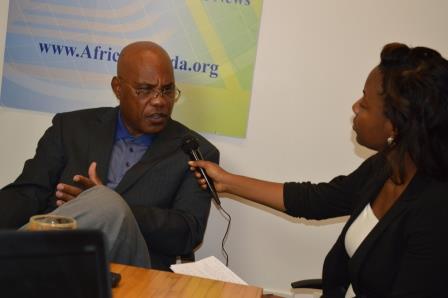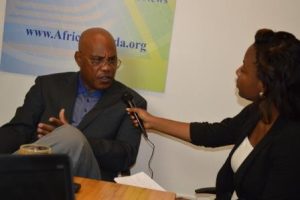Is Emmanuel Weyi “the change” the DRC needs?


Dziedzorm Sanaki speaking with Democratic Republic of Congo (DRC) presidential candidate, Emmanuel Weyi. Denver, September 22, 2015 [Africa Agenda]
The tumultuous past remains a backdrop even as the country charges forward in a new era of elections and democracy.
This trajectory is akin to a stereotype, a glass-half-empty view of the country.
Buts it’s also apparent that the case of the DRC is the symbolism of the struggles reporters face with balancing two sides of every story; what needs to be reported, mostly negative news in a corrupted and dangerous world, and what prospects there are for improvements to occur with the subject of a story.
Today the DRC faces a monumental electoral choice about who will lead the country after the presidential elections in November 2016. That is, should the powers that be leave the date unchanged.
Joseph Kabila, son of former president Laurent Kabila, assassinated in 2001 in the process of the Second Congo War, holds a fragile peace, with opposition parties, civilians, and the international community watching for what moves he will make in his second term as president gradually runs out.
In Congo: Is Democratic Change possible, the International Crisis Group, concerned about the prospects for peaceful elections, sums up the situation as follows:
“The presidential and legislative polls scheduled for 2016 are a potential watershed for the Democratic Republic of Congo (DRC); they could be the first elections held without an incumbent protecting his position. The prospect of these elections is testing nerves on all sides of the Congolese political spectrum and has already caused deadly violence. There is an urgent need for President Joseph Kabila to commit to the two-term limit contained within the constitution and ready himself to leave power.”
The current constitution, enacted in 2006, bars the incumbent from seeking a third term. Yet, Kabila has given no clear indication that he will leave when his mandate expires.
The process of democratization in the DRC, would not be without the participation of opposition parties and its citizens in the process. In the midst of all this, the mostly French-speaking country, the second-largest in Africa and the 11th largest in the world, is going ahead with the creation of new provinces, as well as revisions to its electoral laws.
The opposition, which the Crisis Group describes as “disjointed”, “is incapable of forming a united front, but there is a broad agreement to oppose any political maneuvering to extend President Kabila’s rule beyond 2016. In addition to President Kabila’s ambiguous signals about whether he will respect his two-term limit, problems experienced during the 2011 elections remain; they include a lack of confidence in the Independent National Electoral Commission (CENI) and a disputed voter list.”
In Denver, Colorado resides businessman, Emmanuel Weyi, who is aiming to be the next president of the DRC. As an opposition candidate, Weyi and his “Stand by Me” campaign say they want to bring change to the DRC.
We first heard about the candidate after he gave an interview to Colorado Public Radio in June, stating his plans to be that person to replace Kabila at the helm of the DRC.
He’s been going around to places like the University of Denver, the Colorado Governor’s Mansion, Washington D.C., speaking with people and raising money to help in his pursuit of the presidency of the DRC.
We sat down for a conversation with Weyi to talk about the U.S. presidential elections, the DRC elections, U.S.-Africa relations, and much more. In our interview (see video footage) he expanded on his plan for the DRC.
“Most of the people in the Congo, even the government, the president, or people just visiting Congo, they see problems. As a businessman, I see opportunities,” he says.
The centrally located African country is home to a population of about 70 million people. While the DRC is not eligible under the current Africa Growth and Opportunity Act(AGOA) agreements for 2015, according to the United States Trade Representative, the country is currently the 144th largest goods trading partner with $245 million in total trade in 2013. The bulk of this consists of oil and minerals, according to the U.S. Department of State.
With his many years of experience in business, Weyi promises to bring the DRC back to the stable country that it was. He says one of his plans is to create jobs and open opportunities for those in need. As a businessman, he says in 2003 he started a Fair Trade mining company, Weyi Group International, in the DRC, to do business with the United States.
Weyi states that for the last five years, the people of the DRC have been suffering, which is one main reason he is running for the presidency. With a history of conflict, the country currently has about 430,000 refugees in neighboring countries such as Uganda, Burundi, and Rwanda.
He responded to our questions about the DRC’s image, known as a place of rape and mass murders.
He says one of his campaign platforms is to address how to put an end to attacks on women in the country. A study published in the America Journal of Public Health found that women in the DRC are subjected to sexual attacks every minute in the country. Weyi says he’ll focus on girls’ and women’s issues separately. Educating girls, will open up a bigger door for them to find greater paths.
“The rape in this country is out of control, there is no accountability, the people know that they just can’t go do a bad thing and go home; without nobody holding them accountable, for me as a president you do wrong, I will hold you accountable.”
Speaking about the image of the African continent which is tarnished by the stream of bad news coming out of the country, Weyi says he will address the issue by helping to build on the relationship between America and African countries. He places part of the blame on African leaders, who he says; when they come to the United States don’t do enough to speak about the good things which the continent has to offer.
“I’m blaming all the African leaders, all the presidents, all the prime ministers,” he says. “They are not doing their diligence when they come to America.”
“What the Europeans brought to us was technology, we existed before they came.” Africa has its own resources to live on but we lack the capabilities to see them and put them to good use. We need to get our story out there and show people, what the different stories are of Africa, not every person is waiting for the United Nation to help them. The change starts with the leaders and Weyi promises to start that change in the Democratic Republic of Congo.
But there remains a big question that is haunting Weyi’s campaign. It’s a fact and question about his ability to compete in a campaign in a country he does not live in all the time.
To this question, he answers by stating, “I took 45% of my company back home and open offices in downtown.”
He says for the past years he has spent at least six to seven months in the DRC, to give back and to see what people are facing day in and out.
Editor’s Note: George Bamu contributed to the reporting on this story.
